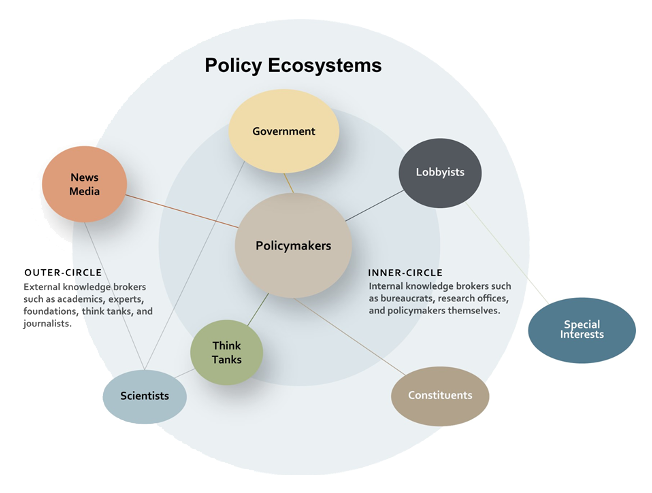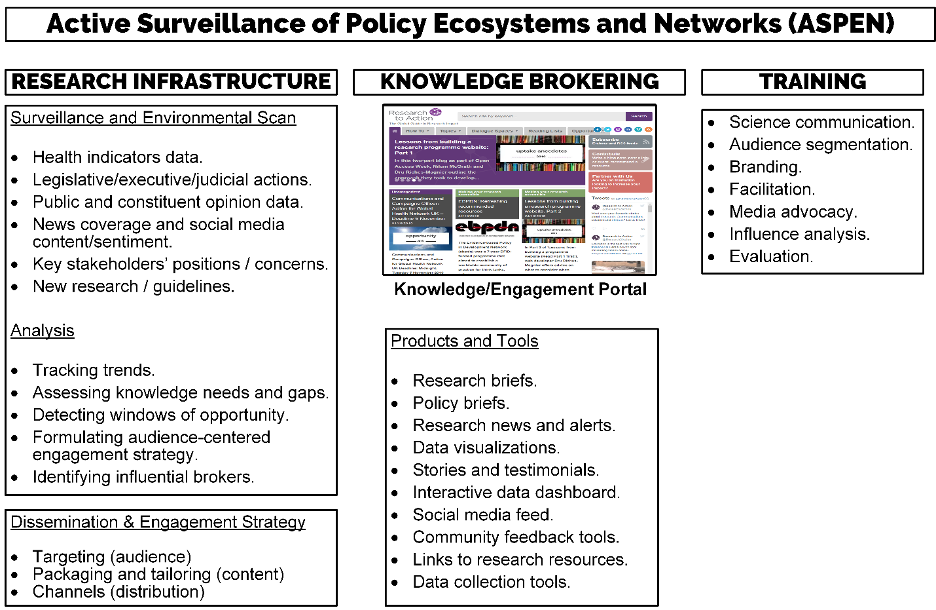
About Us
Active Surveillance of Policy Ecosystems and Networks (ASPEN)
The big idea behind Project ASPEN is that building a robust infrastructure for producing and disseminating research that is relevant to the implantation of evidence-based guidelines will increase the likelihood that such guidelines are adopted and implemented by policymakers.
Public Policy
Public policy has significant potential to improve people’s health when it is informed by science. Our goal is to ensure policymakers at all levels (local, state and national) have access to the best available research when considering policy solutions to public health problems.
Yet access is not the only barrier when encouraging policymakers to adopt scientifically sound best practices. Because of their additional responsibilities to the public and the far reaching consequences of their actions, policymakers are frequently concerned about the prospects of successfully implementing guidelines and recommendations from scientists and researchers, and subsequently producing intended positive health outcomes.
Put simply, the available science is often clear about what needs to happen but less so about how best to get it done.

A case in point is legislation to improve screening for adolescent depression. Adolescent depression is a growing public health problem in the United States, with recent estimates suggesting that as many as 13% of youth nationally (age 12-17) report suffering at least one major depressive episode in the past year. NJ ranks 4th in the nation on this indicator (10.5%), with a significant percentage (6.1%) also reporting co-occurring substance abuse, anxiety and disorderly behavior. The U.S. Preventive Services Task Force guidelines recommend routine screening for depression in children and adolescents aged 12 to 18-years-old. In response, 21 states (NJ included) recently introduced or are considering legislation that will mandate universal access to adolescent depression screening in public schools along these guidelines. Unfortunately, progress on pending legislation is stalling because there remains considerable ambiguity regarding the feasibility, cost, and potential unintended effects of mandating and implementing universal screening for adolescent depression in schools.
Knowledge Brokerage 2.0
Knowledge brokers, or intermediaries who already have robust established relationships with both policymakers and researchers, are often best situated to connected policymakers and researchers..
In the context of efforts to improve use of research evidence, knowledge brokering refers to the use of intermediaries – whether individuals, organizations, or structures – as mediators between researchers and intended users of research. Some familiar examples of knowledge brokers who are active in the public policymaking domain include lobbyists, advocates, think tanks, and journalists. Knowledge brokers have a crucial role in bringing relevant research to policymakers’ attention, translating or interpreting complex research for them, and making connections between research and specific policy-related problems and solutions. Knowledge brokers also build and maintain relationships with other actors who try to influence policy, and push policymakers to act according to scientific guidelines by holding them accountable for producing effective policy solutions to public problems.
Project ASPEN was designed with a particular group of such knowledge brokers in mind: patient advocacy organizations (PAOs). Established PAOs, such as the American Cancer Society (ACS) and the National Alliance on Mental Illness (NAMI), have a recognized and trusted brand; established relationships with scientists, policymakers, and other policy actors; organizational capacity (resources, skilled personnel, and relevant expertise) to broker research (many of them are dissemination partners of government health agencies); are sponsors of research themselves; and are routinely engaged in efforts to shape and influence policy. Research also shows that PAOs are already major brokers of research to state policymakers, who do not enjoy the same access to research that their national counterparts have.
Primary Goal
The primary goal of project ASPEN is to work collaboratively with an established PAO, the National Alliance on Mental Illness New Jersey (NAMI NJ), to produce and disseminate research that is relevant to the implementation of universal screening for adolescent depression in NJ’s public schools. The specific objectives of the project are: (1) to produce research that is directly relevant to key aspects of implementing universal screening for depression in schools; (2) establish a mechanism (a knowledge portal) for brokering this research to policymakers and other actors active in the youth mental health policy field; and (3) enhance NAMI NJ’s capacity to broker research effectively by providing science and strategic communication training.

Project Timeline
July 2019 – June 2022
Phase 1
In Phase 1 of the study (year 1), we will produce original research that state policymakers and other policy stakeholders (advocates, mental health professionals, school personnel, and parents) perceive to be highly relevant to the implementation of universal screening for adolescent depression in schools. In addition, we will gather other relevant research from external sources.
Phase 2
In Phase 2 of the study (year 2), we will collaborate with our research partner (NAMI NJ) to co-design the pretest the ASPEN portal. We will next use the portal to widely disseminate a range of Project ASPEN-branded research products and track their use by policymakers, other knowledge brokers, journalists, and social media influencers.
Phase 3
In Phase 3 of the study (year 3), we will provide a targeted science and strategic communication training to a selected group of NAMI Smarts for Advocacy trainees and track their use of these strategies in support of their advocacy efforts compared to a group of trainees that did not receive the additional training.

